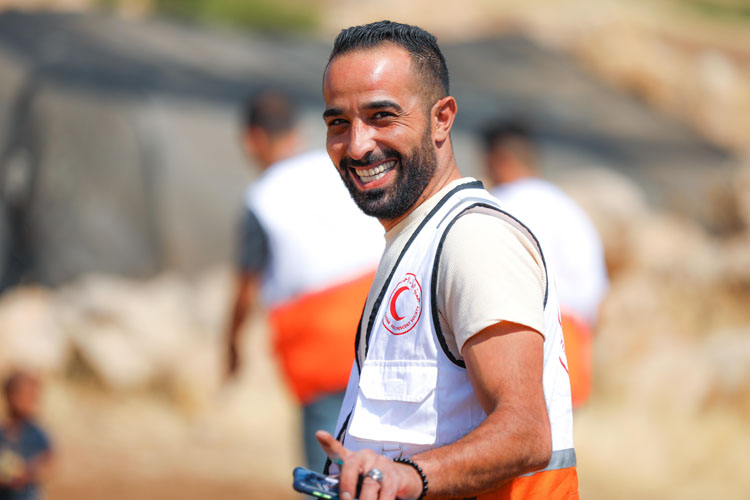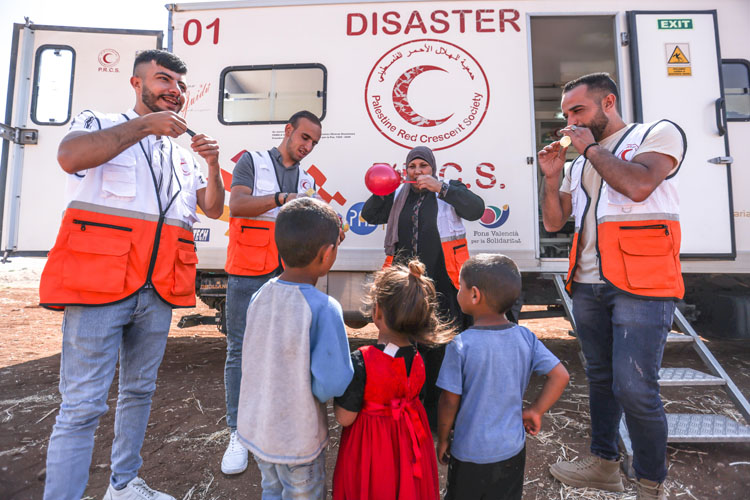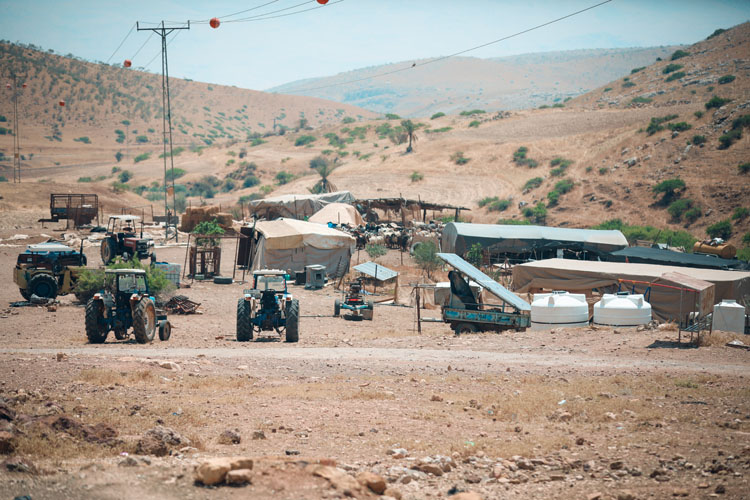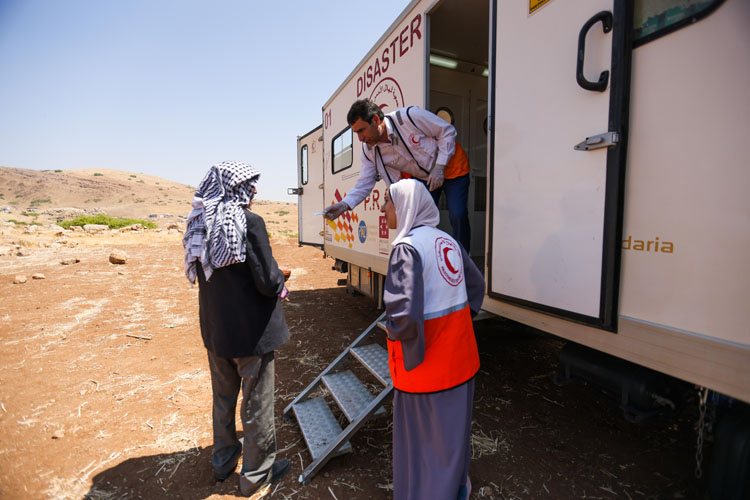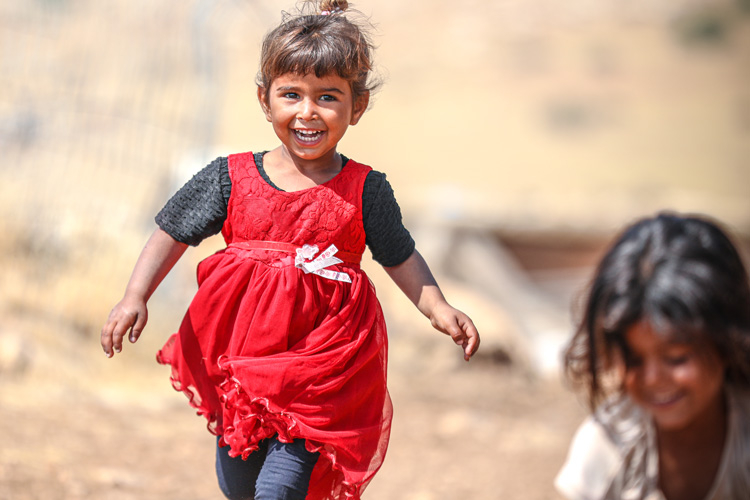Communities in the Jordan Valley depend on precarious mobile clinic access
14 June 2022 - Moaayd Daraghmeh is the driver of a mobile clinic for the Palestine Red Crescent Society (PRCS) operating in the Jordan Valley of the West Bank. He has been part of the clinic team for 10 years, working with communities in remote areas reliant on mobile clinics for access to essential primary health care. The communities face obstacles to planning and development, demolition orders that make their lives and livelihoods precarious and uncertain, and the underprovision of basic services.
“These communities face a lot of violations. The Red Crescent tried four times to assist with building six houses to provide emergency shelter, but each time the houses were demolished… We should be providing health services at least three times a week, but we cover communities in three districts of the Jordan Valley and there is only so much we can do. To reach all communities, the mobile clinic needs to serve two or three communities at a time. Here in Khirbet Al-Meiteh, some people need to walk half an hour from nearby communities to reach us,” Moaayd comments.
Khirbet Al-Meiteh is a community served by Moaayd’s team, located in Wadi Al-Maleh in the northern Jordan Valley, in the governorate of Tubas. The community of 300 people is situated in Area C, where Israel maintains civil and military control. It lies in an area designated as a firing zone, meaning severe restrictions on planning and development, including for roads, schools and health facilities. Residents rely on agriculture and pasture for their livelihoods, which are threatened by land confiscations and expanding settlements in the surroundings. There is lack of adequate protection for the communities, who experience settler- and occupation-related violence and who face loss of livelihoods due to destruction of crops and attacks against livestock.
The nearest permanent primary care facility is in Tubas, which would be around 30 minutes away by car without unpredictable checkpoint delays. Many in Khirbet Al-Meiteh do not have a vehicle, so the mobile clinic serves as a vital lifeline for the community. However, the community remains underserved, with expansion of service provision and establishment of permanent facilities needed.
“The mobile clinic covers part of the needs for our community in Wadi Al-Maleh,” says Mahdi, a member of the community council. “However, we desperately need a permanent facility. We tried to build two rooms last year to use them as clinics, but Israeli forces demolished the rooms. We’ve been unable to build them again due to lack of funding.”
The PRCS clinic Moaayd works for covers Tubas, Nablus and Jericho. Each community or cluster of communities served by the mobile clinic receives one or two visits a month. The clinic itself operates five days a week, providing primary health care on three days and services for women’s health on two days. The team consists of a driver, nurse and doctor, with a social worker joining the team on occasion. Recently, the PRCS community service programme was able to offer additional support to the communities in Wadi Al-Maleh, training youth in the provision of first aid to offer immediate support to injured persons and responding to the high numbers of casualties during demonstrations against settlement expansion.
“As a resident of Tubas, Wadi Al-Maleh is very close to my heart,” Moaayd says. “I feel connected to the people here, and I understand their suffering because I live their experience too. When the community faced demolitions, I was there to help. Despite all our efforts, we need to do a lot more. I’m happy we can provide at least basic health services, but our communities deserve comprehensive health care like all people.”
Occupied Palestinian territory completes round 1 of health-facility based polio campaign
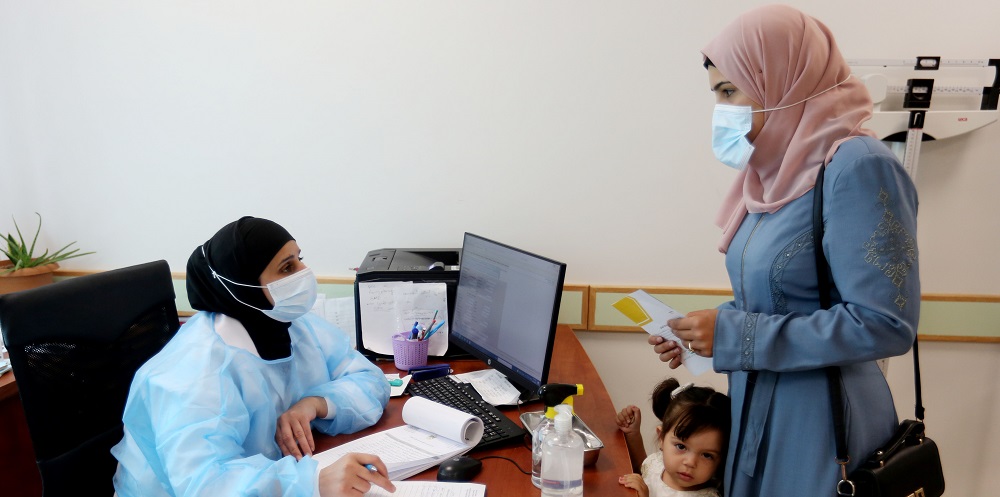 Tamam Taha, a nurse at the Biddo UNRWA health facility, greets a mother at the campaign registration desk
Tamam Taha, a nurse at the Biddo UNRWA health facility, greets a mother at the campaign registration desk
24 May 2022 – Over 16-19 May, parents in the governorates of Bethlehem and Jerusalem were urged to take their children under 5 to health facilities for a supplementary dose of bivalent oral polio vaccine (bOPV) with the aim of boosting their immunity against poliovirus in the face increased regional risk.
Unlike most polio campaigns in the Eastern Mediterranean Region, the mechanism for the campaign in occupied Palestinian territory (oPt) was via health facilities, rather than house to house.
Round 1 tested the resolve of a community that is famously pro-vaccine (routine immunization coverage across oPt is typically between 98% and 100%), but like everywhere, parents are juggling work, childcare and other commitments.
In Biddo, an area of Jerusalem governorate where the main UNRWA clinic serves both local families and those from more remote regions, a steady stream of clinic visitors climbed out of mini-buses and taxis after lengthy journeys.
“Many Bedouins come to us from remote areas like Bani Samuel and Beit Iksa, although the transportation from their areas is very hard for 2 reasons. First, the roads are very difficult, and second, there are a lot of checkpoints that could keep you waiting for hours,” said nurse Tamam Taha.
In some cases, the hurdles parents faced to bring their children to health facilities were starkly visible.
Nidal Kandeel, father of 3-year-old Janette and 21-month-old Jolan, arrived at Biddo UNRWA health facility on crutches.
“I got an injury in my work a year ago, and I’m now disabled for the rest of my life. It was hard for me to come to the clinic using public transportation, but I know how important it is for my children to take the polio vaccine, and this is why I am here,” he said.
Following the campaign at health facilities, nursing teams will review registers of children vaccinated and cross-reference these with patient lists. Parents of children who weren’t vaccinated will be telephoned and efforts made to reach those children through in-clinic follow-up or outreach.
Round 2 is expected in mid to late June, with the aim of raising immunity levels in these 2 governorates.
Palestine has been polio-free for more than 25 years, thanks to a robust routine immunization programme and a strong culture of vaccine acceptance. But following the detection of circulating vaccine-derived poliovirus type 3 (cVDPV3) in sewage outflow coming from inside the green line with wastewater coming from Bethlehem and Jerusalem, the Palestinian Ministry of Health launched efforts to boost immunity in the areas deemed most at risk.
The campaign was carried out with support from WHO, UNICEF and UNRWA’s Palestine country offices.
WHO’s Palestine office provided technical support to the Ministry in planning and executing this campaign, drawing on the extensive expertise of our regional polio eradication programme.
WHO and The Big Heart Foundation Strengthen the Integration of Gender-based Violence Response into Primary Health Care across oPt

Ongoing conflict across the occupied Palestinian territory (oPt) continues to take a heavy toll on the mental and psychosocial health and well-being of a large majority of the population, making it one of the most significant public health challenges. COVID-19 has further exacerbated the situation and contributed to an increase in the incidence of gender-based violence (GBV), which has enhanced the vulnerability of women and girls.
“Lack of resources and specialised services means that mental health disorders and GBV can often go under-reported, under-treated, and under-supported in emergency and conflict contexts. This makes it crucial to ensure that health workers, who serve as the main point of contact at primary health care facilities, are given tools to identify, treat and support people experiencing mental issues and GBV,” said Anna Rita Ronzani, GBV Technical Officer and Trainer, WHO Eastern Mediterranean Region.
Under the leadership of the Ministry of Health (MoH), WHO has been strengthening mental health services across oPt since 2010. As a part of the ongoing efforts, with funding from The Big Heart Foundation, this week two training of trainers were organized for 50 health workers and mental health professionals from Gaza and the West Bank. The training focused on supporting front line health workers, from MoH and UNRWA primary health clinics, understand how to integrate response to gender-based violence into mental health and primary health care services.
“Women’s mental health issues could often be a symptom of GBV they could be experiencing. But without the right training, non-specialist health workers could easily miss the signs. This training will help me screen my patients effectively and refer them to the right service so they could receive appropriate treatment and support and no longer suffer silently,” Dr. Muneera, Medical Officer, UNRWA clinic.
According to a 2013 WHO global multi-sectoral study on violence against women, females who experience GBV are twice as likely to develop mental health issues compared to those are not exposed to such situations. Given this, response to GBV forms an integral component of the WHO Mental Health Gap Action Programme (mhGAP) Intervention Guide (2.0), which is being used to support the integration of mental health services into primary health care health facilities across oPt.
Plans to cascade and make the training accessible to more health workers are being developed by WHO oPt, in collaboration with MoH However, lack of funding remains a major obstacle in rapidly expanding mental health services and ensuring the availability of trained professionals. .
Gaza child dies following repeated permit delays by Israel
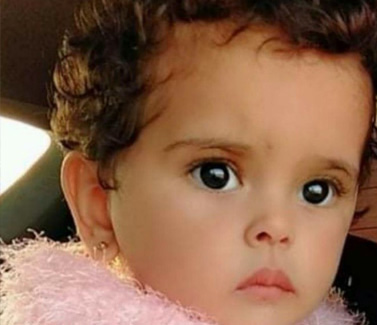 Fatma Al-Masri was a 19-month-old girl from Khan Younis in the Gaza Strip. She died on 25 March 2022 after she was delayed access to lifesaving cardiac surgery for nearly three months. Fatma was born with a congenital heart condition known as an atrial septal defect. She needed curative surgery at Makassed Hospital in East Jerusalem and was required by Israel to obtain a permit to reach her hospital appointment. Her family applied three times for permits to reach hospital appointments on 28 December 2021, 13 February 2022, and 5 April 2022. She also received hospital appointments for 6 and 27 March, though at this stage no permit application was submitted by the Palestinian Health Liaison Office. Fatma’s father was told this was because there would not enough time for processing of the permit application.
Fatma Al-Masri was a 19-month-old girl from Khan Younis in the Gaza Strip. She died on 25 March 2022 after she was delayed access to lifesaving cardiac surgery for nearly three months. Fatma was born with a congenital heart condition known as an atrial septal defect. She needed curative surgery at Makassed Hospital in East Jerusalem and was required by Israel to obtain a permit to reach her hospital appointment. Her family applied three times for permits to reach hospital appointments on 28 December 2021, 13 February 2022, and 5 April 2022. She also received hospital appointments for 6 and 27 March, though at this stage no permit application was submitted by the Palestinian Health Liaison Office. Fatma’s father was told this was because there would not enough time for processing of the permit application.
Fatma’s hospital appointments and permit applications:
|
Appointments |
Permit application date |
Destination |
Israeli response |
|
28 December 2021 |
26 December 2021 (urgent) |
Makassed Hospital |
Under study |
|
13 February 2022 |
31 January 2022 |
Makassed Hospital |
Under study |
|
6 March 2022 |
No application |
Makassed Hospital |
N/A |
|
27 March 2022 |
No application |
Makassed Hospital |
N/A |
|
5 April 2022 |
22 March 2022 |
Makassed Hospital |
Under study (Response after Fatma’s death) |








